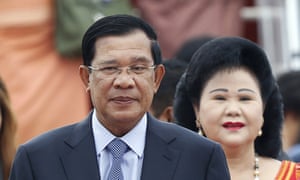 |
| The family of Hun Sen, shown with wife Bun Rany, is accused of bleeding the country of wealth under his prime ministership. Photograph: Lai Seng Sin/AP |
'Stranglehold': Hun Sen rules Cambodia and his family own it, says report
Relatives of autocratic PM control economy’s most profitable sectors from mining to gambling and property, according to findings of Global Witness project
The Guardian | 7 July 2016
A transparency watchdog has alleged a “stranglehold” on the Cambodian economy by the family of Hun Sen – one of the world’s most notorious autocrats, who has ruled the south-east Asian country across three decades.
Investigators from UK-based Global Witness who traced corporate ownership said they had uncovered numerous examples where companies linked to members of the Hun family managed to secure lucrative public contracts and state concessions to amass vast fortunes.
Firms associated with the Hun family span the majority of Cambodia’s most lucrative business sectors, including trade, finance, energy and tourism, according to the report, while also operating within a number of sectors notorious for corruption including gambling, construction, agriculture and mining.
In some cases these companies have driven “devastating impacts for Cambodian citizens and the environment, including land grabs that have caused mass displacements and destitution among Cambodia’s rural poor”, Global Witness says.
Global Witness said this was likely just a fraction of the true value of the family’s business holdings as they were said to obscure their commercial interests.
“These revelations point to a cruel irony of Hun Sen’s model of dictatorship – his family has Cambodia’s economy so sewn up that Phnom Penh residents are likely to struggle to avoid lining the pockets of their oppressors multiple times a day,” said Patrick Alley, Co-Founder of Global Witness.
“Foreign investors, on the other hand, can and should opt out of bankrolling a regime that kills, intimidates or locks up its critics.”
Hun Sen, a former Khmer Rouge commander, has marketed his country to overseas investors as an attractive investment destination with very little regulation and cheap labour.
Yet despite overall economic growth, six million Cambodians, 40% of the population, still live below or close to the poverty line. And in 2015 Cambodiaranked 150th out of 168 countries in Transparency International’s Corruption Perceptions Index, the lowest score in south-east Asia.
The leader’s tenure has been characterised by electoral fraud and the brutal suppression of political opposition. In 2011 Hun said that if anyone tried to hold a demonstration against his rule “I will beat all those dogs and put them in a cage.”
In May 2016 journalists were instructed to use his full title “Lord Prime Minister and Supreme Military Commander” when writing about Hun Sen.
In 103 of the 114 private companies where Hun Sen’s immediate family have declared interests, the relative is a chairperson, director or has a shareholding of more than 25%, meaning they exercise total or substantial control, the report says.
Stephen Peel, a former senior partner at private equity firm TPG Capital and member of the Global Witness board, said: “[Doing] business with companies that are owned or controlled by the country’s ruling family not only raises ethical questions, it also carries significant legal, financial and reputational risk.”
The UK is the second-largest foreign investor in Cambodia after China, while the US is Cambodia’s biggest trading partner, receiving a third of Cambodian exports, worth almost US$3bn a year.
Hun Sen’s eldest daughter, Hun Mana, has the largest number of business holdings of any member of the family, the report finds, with interests in 22 companies with listed share capital of more than $66m.
She owns 100% of the shares of media company Bayon Media, which broadcasts three TV stations, and also Bayon Radio, which is considered to be one of the leading mouthpieces of the ruling party.
Hun Mana chairs Moon Media, an advertising firm behind a large proportion of the billboards around the country. The company’s client list on its website includes Visa, Unilever, Proctor & Gamble and Honda.
She is also a director and shareholder of K Thong Huot Telecom, which was founded in 2002 to distribute Nokia phones in Cambodia. The firm is the local business partner of Lenovo-IBM and holds exclusive distribution licences for Pioneer and Electrolux products.
The prime minister’s office, Moon Media and Bayon Media did not respond to Guardian requests for comment. The Guardian was unable to reach K Thong Huot Telecom.
Other prominent family members with business links include Hun Sen’s son-in-law Sok Puthyvuth, the CEO of the Soma Group, which signed a $3m biomass power deal with US conglomerate General Electric in 2012.
Soma Group, which did not respond to a request for comment for this article, is also linked to an urban land grab, Global Witness says, as the firm is expanding Phnom Penh International Airport.
The project threatens to displace approximately 165 households without providing compensation. In 2012 eight protesters from the community were arrested by armed police and detained for 12 hours after painting SOS signs on the roofs of their houses in the hope that President Obama would see their cries for help as he flew in to attend an Asean summit.
Global Witness said Sok Puthyvuth was the only Hun family member to reply to its requests for comment.
It quoted him as saying that his family had objected to his taking a role in politics so he entered the private sector “to test my ability to build an effective organisation”.
“I can understand your assumption that I have abused my power to get to where I am today, but I can assure you that I take seriously the challenge of building a responsible and respected private sector group. I admit it is a work in progress.
“I understand that I live in the shadows of my family.”


No comments:
Post a Comment